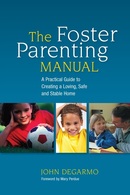
Let there be no mistake; foster parenting is hard work! It may just be the hardest work you ever do. You will often find yourself exhausted, both mentally and physically, and feel drained. There is very little money available to help you, and you will not be reimbursed for all the money you spend on your foster child. The job will require you to work 24 hours a day, 7 days a week, with no time off. You will probably feel overworked and underappreciated. You will work with children who are most likely coming from difficult and harmful environments. Some of these children will have health issues, some will come with behavioral issues, and some will struggle with learning disabilities. Many times, the children you work with will try your patience, and leave you with headaches, frustrations, disappointments, and even heartbreaks. There is a reason why many people are not foster parents, as it is often too difficult. The turnover rate for foster parents in the United States is between 30% and 50% each year.
- Join the thousands who receive Dr. DeGarmo's FREE foster care newsletter. Simply fill out the form below.
One of the keys to preventing burnout is awareness. Once you are aware that you are truly exhausted and facing burnout, you can then take steps to better care for yourself. If you are feeling exhausted, run down, depressed, unmotivated, hopeless or powerless, or even feel like running away, you may be experiencing burn out. Changes need to be made, otherwise you will not only suffer, but your marriage, your family, your children, and even your job will suffer, as well.
To begin with, as difficult as it may be in a busy home, you will need to find ways to relax. For each person, it is different. My wife enjoys playing what she calls mindless games on her ipad while in bed at night. For myself, I find relaxation in watching old black and white movies. For others, it may be taking a walk, writing in a journal, playing music, or another form of entertainment.
There are a number of other ways to help reduce stress and burnout, including lifestyle changes, diet, exercise, support groups, and even respite care If burnout is left untreated or ignored, there can be serious complications for not only the foster parent, but for the foster child, as well. After all, if you are too exhausted and feeling burn out, you will have a difficult time giving the love and support a foster child sorely needs.
Dr. John DeGarmo
For more, purchase Dr. DeGarmo’s training book The Foster Parenting Manual: A Practical Guide to Creating a Loving, Safe, and Stable Home. Click HERE for your signed copy.


 RSS Feed
RSS Feed